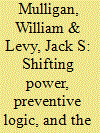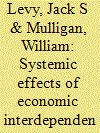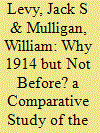|
|
|
Sort Order |
|
|
|
Items / Page
|
|
|
|
|
|
|
| Srl | Item |
| 1 |
ID:
099039


|
|
|
|
|
| Publication |
Cambridge, Cambridge University Press, 2010.
|
| Description |
viii, 256p.Pbk
|
| Standard Number |
9780521713948
|
|
|
|
|
|
|
|
|
|
|
|
Copies: C:1/I:0,R:0,Q:0
Circulation
| Accession# | Call# | Current Location | Status | Policy | Location |
| 055285 | 940.53/MUL 055285 | Main | On Shelf | General | |
|
|
|
|
| 2 |
ID:
153326


|
|
|
|
|
| Summary/Abstract |
If a declining state has incentives for preventive war, the rising state should have incentives to delay a confrontation until it is stronger. We develop the theoretical paradox and examine the July 1914 crisis. Why did Russia, rising relative to Germany, not adopt a buying-time strategy? We argue that although most Russian leaders hoped to avoid a confrontation, they feared that the failure to support Serbia would lead to a loss of Russian credibility and a significant setback to Russia’s position in the Balkans, one that could not easily be reversed, even with Russia’s expected increase in relative military power.
|
|
|
|
|
|
|
|
|
|
|
|
|
|
|
|
| 3 |
ID:
193172


|
|
|
|
|
| Summary/Abstract |
Empirical research generally supports the dyadic-level trade-promotes-peace hypothesis, while demonstrating that the relationship is weaker, more complex, and more conditional than liberal theory suggests. We shift to the system level and examine a neglected path to conflict in economically interdependent systems. In the great power competition for support among smaller states, a great power at a competitive disadvantage in economic instruments of influence may be incentivised to adopt more militarised strategies. We illustrate our argument with case studies of Austro-Hungarian and Russian influence strategies before the First World War and of Prussian strategies among German states before the Franco-Prussian War.
|
|
|
|
|
|
|
|
|
|
|
|
|
|
|
|
| 4 |
ID:
075855


|
|
|
|
|
| Publication |
2006.
|
| Summary/Abstract |
This article examines British policy in the Liman von Sanders crisis, which arose between Germany and Russia in late 1913. It takes issue with recent arguments that Britain was too closely bound to the Dual Alliance of France and Russia, that concern for her Indian empire determined her foreign policy, and that the Anglo-German cooperation in 1912 and 1913 was a hollow détente. Britain played an important role in resolving the crisis, by restraining an erratic Russian policy and appealing to Germany to make concessions. Moreover, Britain was the dominant power in the entente and influenced French restraint in this crisis. This served Britain's interests in Turkey, which aimed at the strengthening of that state. Finally, the resolution of the crisis demonstrated a functioning international system, based on alliances and the Concert of Europe, not a system on the verge of collapse into war.
|
|
|
|
|
|
|
|
|
|
|
|
|
|
|
|
| 5 |
ID:
180456


|
|
|
|
|
| Summary/Abstract |
Why did the July 1914 crisis—but not crises in 1905, 1908–9, 1911, and 1912–13—escalate to great-power war despite occurring under similar international and domestic conditions? Explanations based on underlying and slowly changing structural, social, or cultural variables cannot answer this question. Examining three Balkan crises of 1912–13 and the July Crisis, we refine realist explanations based on power, alliances, and reputational interests by incorporating the impact of changing power distributions and alliances in the Balkans on the great-power security system. A more complete answer to the why-1914-but-not-before question, however, requires the incorporation of Franz Ferdinand’s assassination, which went beyond a pretext for war. It eliminated the most powerful and effective proponent for peace in Vienna and fundamentally changed the nature of the decision-making process in Austria-Hungary. Counterfactually, we argue that a hypothetical crisis with Franz Ferdinand present would probably have ended differently.
|
|
|
|
|
|
|
|
|
|
|
|
|
|
|
|
|
|
|
|
|